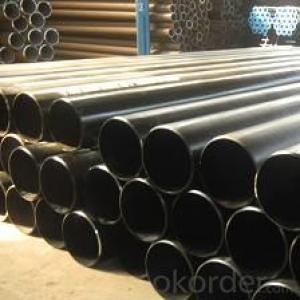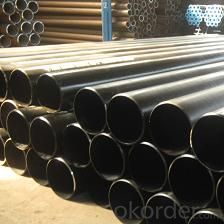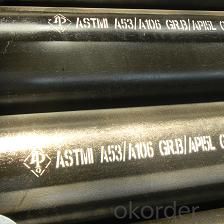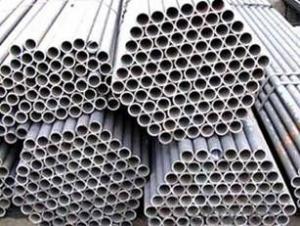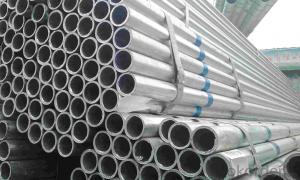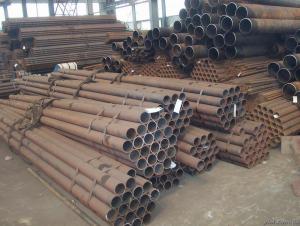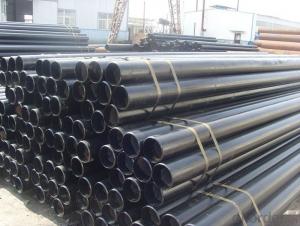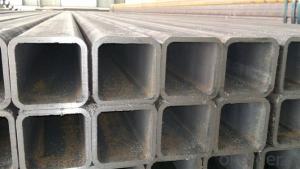STEEL PIPE SEAMLESS PIPE
- Loading Port:
- China Main Port
- Payment Terms:
- TT OR LC
- Min Order Qty:
- -
- Supply Capability:
- -
OKorder Service Pledge
OKorder Financial Service
You Might Also Like
Standard: API 5L, API 5CT, ASTM A106/A53, ASTM A519, JIS G 3441, JIS G3444, JIS G3445 DIN 2391, EN10305, EN10210, ASME SA106, SA192, SA210, SA213, SA335, DIN17175, ASTM A179…
Out Diameter: 1/8 – 30 inch (10.3-762mm)
Wall Thickness: 0.049” – 2.5” (1.24- 63.5mm)
Length: Random Length, Fixed Length, SRL, DRL
Steel Grade:
API 5L: GR B, X42, X46, X56, X60, X65, X70
ASTM A53/A106: GR A, GR B, GR C
ASME SA106: GR.A, GR.B, GR.C
ASME SA192: SA192
ASME SA209M: T1, T1a
ASME SA210: GR.A-1, GR.C
ASME SA213: T2, T5, T9, T11, T12, T22
ASME SA335: P2, P5, P9, P11, P12, P22, P91
DIN17175:ST35.8, ST45.8, 15Mo3, 13CrMo44
- Q: How are steel pipes used in the construction of dams and water reservoirs?
- Steel pipes are commonly used in the construction of dams and water reservoirs due to their durability, strength, and ability to withstand high pressure and heavy loads. These pipes are utilized in various important aspects of dam and reservoir construction. One of the main uses of steel pipes in these structures is for the transportation of water. Steel pipes are used to convey water from the source, such as a river or stream, to the reservoir or dam. These pipes are designed to withstand the high water pressure and ensure that there is a continuous flow of water to the reservoir. The durability of steel pipes allows them to remain intact even in harsh conditions and environments. In addition to transporting water, steel pipes are also used for drainage purposes. They are used to create drainage systems that help regulate the water level in the reservoir or dam. These pipes are strategically placed to control the flow of water and prevent any potential flooding or overflow. Steel pipes are also used in the construction of the spillways and outlets in dams and reservoirs. Spillways are designed to release excess water from the reservoir during heavy rainfall or when the water level is too high. Steel pipes are used in the construction of these spillways to provide a controlled path for the water to flow out of the reservoir, preventing any damage to the dam or surrounding areas. Furthermore, steel pipes are utilized in the construction of penstocks, which are large pipes that transport water from the reservoir to the turbines in a hydropower plant. The pressure generated by the water in these pipes is used to drive the turbines and generate electricity. The strength and durability of steel pipes are crucial for ensuring the smooth and efficient operation of hydropower plants. Overall, steel pipes play a vital role in the construction of dams and water reservoirs. Their durability, strength, and ability to withstand high pressure make them an ideal choice for various aspects of these structures, including water transportation, drainage systems, spillways, and penstocks.
- Q: What are the specific differences between flexible pipes and rigid pipes?
- The rigid waterproof sleeve is used in the wall of the building which does not need to bear the vibration and expansion deformation of the pipe, and the wall thickness is 200mm in general;Flexible waterproof sleeve is mainly applicable to the wall of buildings with seismic requirements, pipeline vibration and expansion deformation, and strict waterproof requirements, and the wall thickness is 300mm
- Q: What are the different types of thread connections used in steel pipes?
- There are several types of thread connections commonly used in steel pipes, including tapered threads such as NPT (National Pipe Taper), which are designed to create a tight seal, and straight threads like NPS (National Pipe Straight), which are often used for mechanical applications. Additionally, some other types of thread connections used in steel pipes include BSP (British Standard Pipe), which is widely used in Europe, and API (American Petroleum Institute) threads, which are commonly used in the oil and gas industry.
- Q: What are the different sizes of threads available for steel pipes?
- The different sizes of threads available for steel pipes include standard pipe threads such as NPT (National Pipe Taper) and NPS (National Pipe Straight), as well as metric pipe threads like MPT (Metric Pipe Taper) and MPS (Metric Pipe Straight). These sizes can vary from 1/8 inch all the way up to several inches in diameter, depending on the specific application and industry requirements.
- Q: How are steel pipes protected against UV radiation?
- Steel pipes are typically protected against UV radiation through the application of specialized coatings or paints that contain UV inhibitors. These coatings form a barrier between the steel surface and the sun's UV rays, preventing degradation, discoloration, and potential structural damage caused by prolonged exposure to UV radiation.
- Q: How are steel pipes used in the construction of bridges?
- Steel pipes are commonly used in the construction of bridges as they provide structural support and stability. They are often used as piers or columns to bear the weight of the bridge deck and transfer the load to the foundation. Additionally, steel pipes are used for the construction of bridge railings and barriers, providing safety for pedestrians and vehicles. Overall, steel pipes offer durability, strength, and flexibility, making them an essential component in bridge construction.
- Q: How long do steel pipes last?
- There are several factors that can influence the lifespan of steel pipes. These factors include the quality of the steel used, the installation environment, and the maintenance and care provided to the pipes. Steel pipes are generally recognized for their durability and long life. When properly installed and regularly maintained, steel pipes can endure for many decades, sometimes even surpassing 50 years. However, it is important to consider external factors that can greatly impact their lifespan, such as corrosion, exposure to extreme temperatures, and chemical reactions. To ensure the reliability and functionality of steel pipes for an extended period, it is crucial to conduct regular inspections, make timely repairs, and apply protective coatings.
- Q: Can steel pipes be used for underground chemical pipelines?
- Indeed, underground chemical pipelines can utilize steel pipes. The chemical industry, among other industries, extensively employs steel pipes owing to their robustness, potency, and resistance to corrosion. To ensure suitability for underground chemical pipelines, it is crucial to select an appropriate steel grade that can withstand corrosion from the specific chemicals being transported. Furthermore, the resistance of steel pipes to chemical corrosion can be further augmented through the implementation of suitable coating and lining techniques. Regular inspection and maintenance are imperative to guarantee the integrity and safety of the underground chemical pipeline system.
- Q: How are steel pipes used in the construction of water treatment plants?
- Steel pipes are widely used in the construction of water treatment plants due to their numerous advantages and suitability for this specific application. These pipes are utilized in various ways to ensure the efficient and reliable functioning of water treatment facilities. Firstly, steel pipes are commonly used in the transportation of water from its source to the treatment plant. They are highly durable and can withstand high pressure, ensuring the safe and secure delivery of water over long distances. Steel pipes are also resistant to corrosion, which is crucial in preventing contamination of the water supply. Within the treatment plant, steel pipes are used in the distribution system to transport water to different treatment processes. They are often laid underground or within the facility's infrastructure, ensuring a seamless flow of water between different treatment units. Steel pipes are known for their high strength and structural integrity, making them suitable for this purpose. Furthermore, steel pipes are used in the construction of various water treatment equipment. For instance, they are utilized in the construction of sedimentation tanks, where water is allowed to settle, and impurities are removed. Steel pipes are also used in the construction of filtration systems, where water passes through different layers of filters to remove contaminants. Another important application of steel pipes in water treatment plants is in the construction of pumping stations. These stations are responsible for maintaining the water flow throughout the treatment process. Steel pipes are employed in the design and construction of the pumping systems to ensure the efficient movement of water between different stages of treatment. In summary, steel pipes play a crucial role in the construction of water treatment plants. They are used for the transportation of water, distribution within the facility, construction of treatment equipment, and in the design of pumping stations. Their durability, resistance to corrosion, and high strength make them an ideal choice for this critical infrastructure.
- Q: How are steel pipes used in the manufacturing of pharmaceutical equipment?
- Steel pipes are commonly used in the manufacturing of pharmaceutical equipment for various purposes such as transferring fluids, gases, and chemicals, as well as providing structural support to the equipment. These pipes are known for their durability, corrosion resistance, and ability to withstand high pressure, making them ideal for ensuring the safe and efficient operation of pharmaceutical machinery.
Send your message to us
STEEL PIPE SEAMLESS PIPE
- Loading Port:
- China Main Port
- Payment Terms:
- TT OR LC
- Min Order Qty:
- -
- Supply Capability:
- -
OKorder Service Pledge
OKorder Financial Service
Similar products
Hot products
Hot Searches
Related keywords
